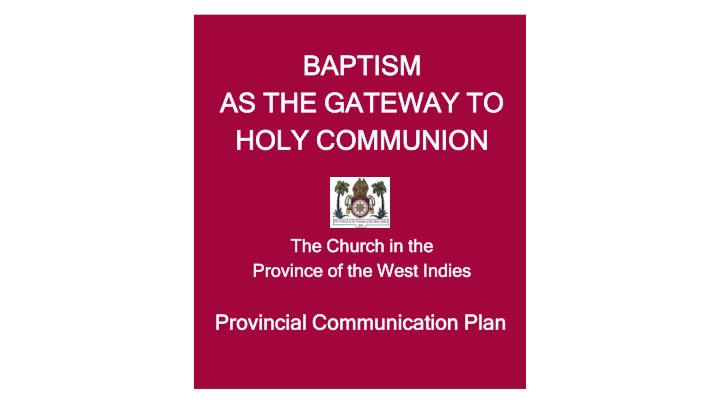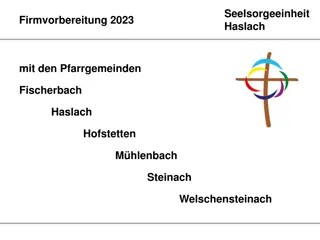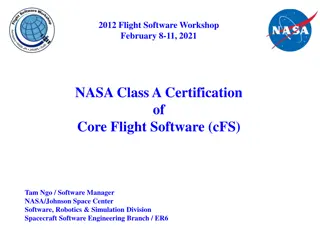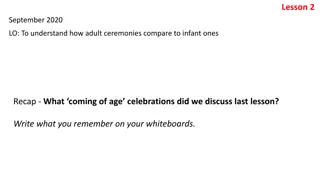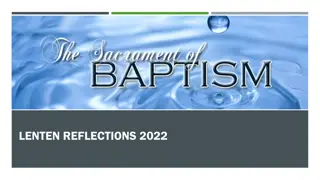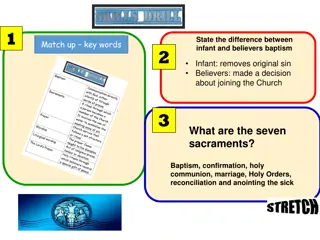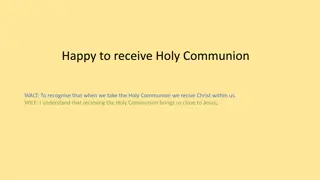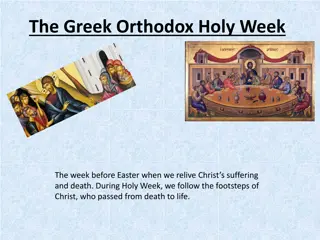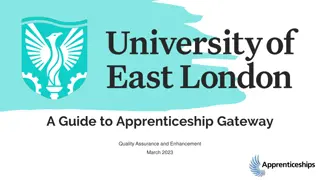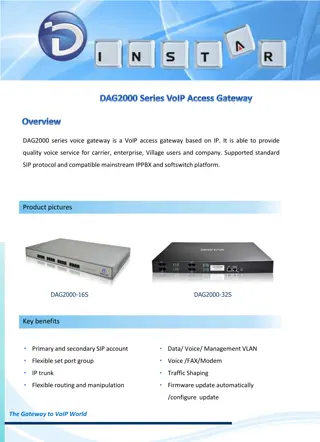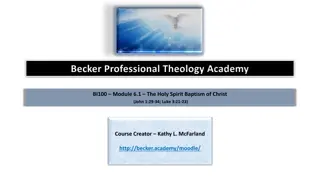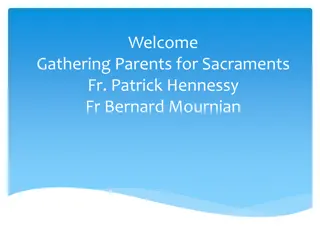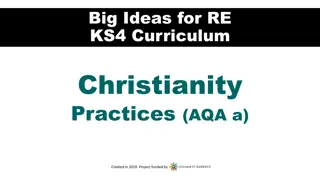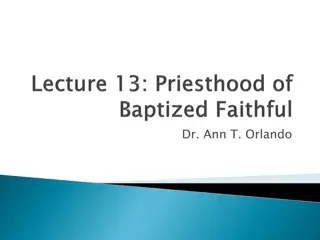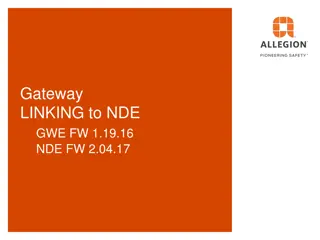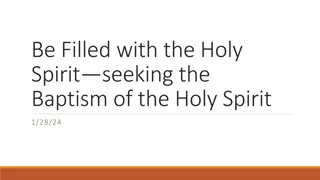The Significance of Baptism as the Gateway to Holy Communion
Baptism as the Gateway to Holy Communion emphasizes the direct link between baptism and the ability to partake in the Eucharist without additional requirements. This change, endorsed in 2019 by the Province of the West Indies, aligns with the practices of the Early Church and highlights the sacramental unity within Christian initiation. The historical context, theological reflection, and decision-making process behind this shift point to a return to the foundational principles of Christian rites. By understanding the role of baptism in facilitating access to Holy Communion, the Church aims to honor its historical roots and ensure a cohesive approach to sacramental life.
Download Presentation

Please find below an Image/Link to download the presentation.
The content on the website is provided AS IS for your information and personal use only. It may not be sold, licensed, or shared on other websites without obtaining consent from the author.If you encounter any issues during the download, it is possible that the publisher has removed the file from their server.
You are allowed to download the files provided on this website for personal or commercial use, subject to the condition that they are used lawfully. All files are the property of their respective owners.
The content on the website is provided AS IS for your information and personal use only. It may not be sold, licensed, or shared on other websites without obtaining consent from the author.
E N D
Presentation Transcript
BAPTISM BAPTISM AS THE GATEWAY TO AS THE GATEWAY TO HOLY COMMUNION HOLY COMMUNION The Church in the The Church in the Province of the West Indies Province of the West Indies Provincial Communication Plan Provincial Communication Plan
Baptism as the Gateway to Holy Communion 150th Synod of the Diocese of Jamaica and The Cayman Islands Presenter: Rev. Natalie Blake Director of Christian Education Diocese of Jamaica & The Cayman Islands
What is What is Baptism as the Gateway to Holy Communion refers to a change in the application of the use of baptism. Baptism is a complete initiation sacrament which makes each person a full member of the Church, the Body of Christ. Therefore, no additional steps or processes will be required before baptized persons are able to receive Holy Eucharist. Baptism as Baptism as the Gateway the Gateway to Holy to Holy Communion Communion
A Little Taste of History A Little Taste of History In the First Century Church, Baptism was the Gateway to Holy Communion. According to the Didache (one of the oldest Christian documents), those who are not baptized in the Lord s name are forbidden from participating in the Holy Eucharist.
A Little Taste of History A Little Taste of History The Bishop baptized the candidates. Baptism involved pouring water thrice upon the candidate s head in the name of the Father, Son, and Holy Spirit. They were chrismated by the Bishop and then invited to join the congregation at Holy Eucharist. There was no separate sacrament of Confirmation
The decision was taken in 2019 by the Fortieth Session of the Provincial Synod of the Church in the Province of the West Indies. When and Who Made the Decision It endorsed the unanimous agreement by the House of Bishops. It followed a period of reflection on the history and theology that are fundamental to the rites of Christian Initiation and admission to Holy Communion. for the Province to return to this Practice of the Early Church? These reflections and consultations were conducted within each Diocese.
Why Are We Making This Change? There is a recognition that the Early Church required only Baptism as the Gateway to Holy Communion and therefore we should return to this position. Baptism is a complete Christian initiation sacrament in which we are made full members of the church. Therefore, we should enjoy the full benefits of the family of the Church, including participating in the Sacrament of Holy Communion.
How will this change affect how we operate in the Province? It means that all persons baptised in water and the Holy Trinity will be admitted to Holy Communion, without having to be confirmed.
All baptised children will be freely welcomed to Holy Communion as their parents and guardians permit. Our Church baptises children: Children, parents and guardians, in consultation with their priest, will be the ones to help to make the decision when baptised children will be admitted to Holy Communion. Will they be admitted to Holy Communion?
When Will The Change Become Effective? When Will The Change Become Effective? The change will follow an extensive process of teaching and communication at parish level. This process will focus on formation in faith, formation in worship and formation in spiritual discipline. There must be a transition resolution by the House of Bishops, subsequently passed by the Provincial Synod, before the change can take effect.
Confirmation can become a mature affirmation of faith and recommitment to the vows made in Baptism. So, what about Confirmation what will happen to It would be available to adults who have engaged in reflection and study and are ready to recommit and affirm their relationship with God and the baptismal promises made on their behalf. that?
Who will teach our children now that there may no longer be Confirmation classes? With the transition of Confirmation to become an adult exercise, parents and guardians will need to play a greater role in the faith formation of their children or wards. It is widely recognized that faith formation is most effective in informal settings where ideas, beliefs, and feelings can be shared. The interpersonal relationships in the home provide the best setting for the transmission of faith.
Who Will Teach Our Children Now That There May No Who Will Teach Our Children Now That There May No Longer Be Confirmation Classes? Cont. Longer Be Confirmation Classes? Cont. Resources will be provided for parents, guardians and Sunday Schools to teach our children about their baptism and the responsibilities that accompany it. Most importantly, parents and guardians must equip themselves by continuing their Christian Education in Bible Studies and Adult Sunday School. They must be prepared to model the behavior they desire in their children as they live out the Jesus-shaped life and bring his teachings to life for their children so that they may learn by example.
What should we be doing now, until the change becomes effective? Now is the time for deliberate, intentional learning about our Baptism, and the Holy Eucharist. We should be participating in Bible Studies to reflect spiritually on our Baptism and its meaning for us as a church community and as individuals. We should begin to prepare ourselves to teach our children, as we seek to take greater responsibility for their faith formation.
What should we be doing now, until the change becomes effective? We must also be prepared to engage discussion about the change, with open minds and hearts. We must commit all that we do to God s direction through prayer.
Please Note Please Note The Following The Following
Baptism as the Gateway to Holy Communion means that persons will be required to be baptized in water and the Holy Trinity before they can receive Holy Eucharist. The Theology, and Practice of Baptism are not changing One application of baptism is being restored The return to the Early Church Practice of Baptism as the requirement for Holy Communion
Confirmation will no longer be the Gateway to Holy Communion Persons will no longer be required to be confirmed before they can receive Holy Communion. They will be required to be baptized before they can receive the sacrament.
The Theology of Confirmation is not changing One application of Confirmation IS CHANGING The underlying theological understanding of Confirmation remains unchanged It is a public affirmation of the baptismal vows The practice of using confirmation as a requirement before one can receive Holy Communion will come to an end.
Key Takeaways The theology of Baptism remains unchanged. What the church believes and teaches about baptism is Not being altered. The use of the rite of Confirmation as the gateway to Holy Communion is being changed Persons will no longer be required to be confirmed before they can receive Holy Communion The timing of Confirmation is being changed Confirmation will no longer be recommended for 12 year-olds but will become an adult affirmation of faith
Returning to the Early Church Returning to the Early Church Practice of Baptism as the Practice of Baptism as the Gateway to Holy Communion Gateway to Holy Communion
CPWI Plan for Communicating The Change CPWI Plan for Communicating The Change Our Vision: Every member becoming fully educated about Baptism and the policy change with regards to receiving Holy Communion Our Goals: To ensure the dissemination of information in a clear and straightforward manner To convey information about the change in policy regarding Baptism as the gateway to Holy Communion:- That Baptism will become the only requirement for receiving Holy Communion in the CPWI.
Communication Plan: Summary Communication Plan: Summary Through the different strategies and resources, we hope to effectively disseminate information on the policy change in a clear and straightforward manner. The Plan envisions partnerships among key stakeholders: Bishops, Members of Clergy and Licensed Church Workers, Sunday School Teachers, Congregants, Parents, and children Diocesan Communication Teams will also be required to coordinate the activities being proposed.
Stage 1 Stage 1 Getting the Getting the Word Out Word Out
1. Getting the Word Out: 1. Getting the Word Out: This is the promotion phase of the Plan. Promotional videos, discussion events, event launches to promote posters and flyers, and Sunday School Resources will be used to ensure that: All members of the Province hear that there will be a policy change, what it will be and when it will become effective.
Stage 2 Stage 2 TEACHING TEACHING TIME TIME
2. Teaching Time: 2. Teaching Time: The Plan requires teaching about Baptism and the impact of the Policy change to Baptism as the Gateway to Holy Communion. Diocesan Communication Teams will be required to organize sessions to target the main stakeholders who will actually teach in the local congregations, i.e., Members of clergy and Licensed Church Workers and Sunday School Teachers.
Teaching Topics Teaching Topics Topics Include: 1. What is Baptism Theology of Baptism 2. What is Holy Communion 3. History of Confirmation 4. Why the need for a change to Baptism as the gateway to Holy Communion 5. How to engage families in determining that their child/ ward is ready to receive Holy Communion 6. How to engage the wider church in understanding Baptism, Holy Communion and Confirmation 7. How to teach Sunday School teachers to engage children in understanding Baptism
TEACHING TEACHING RESOURCES RESOURCES
3. Teaching Resources: 3. Teaching Resources: For the Communication Plan to be effective, there must be supporting resources that are agreed upon and accessible across the Province. Specific resources will be made available to their target group. However, all will be made available online at the Provincial website (for Provincial Resources) and Diocesan websites for specific Diocesan resources.
List of Resources List of Resources 1. Baptism as the Gateway short answer leaflet (Policy Background Information) Produced in Triplicate 2. Exploring Baptismal Theology 3. Baptism as the Gateway with History of Confirmation booklet 4. Bible Study Guide on Baptism 5. Provincial Guidelines on Baptism as the Gateway to Holy Communion (For Church members)
List of Resources List of Resources 6. Provincial Guidelines on Baptism as the Gateway to Holy Communion (For Clergy and Licensed Church Workers) 7. Provincial Guidelines on Baptism as the Gateway to Holy Communion (For Teachers, Parents, and Children)
List of Resources List of Resources 8. Sunday School Curriculum: Baptism (containing lesson plans, resource materials, background information) 9. What every Parent should know and teach their child about Baptism (Covenant document) 10. When is your child ready for Holy Communion Booklet 11. Teach me about Holy Communion (Children s Guide) 12. Flyers & Posters
BAPTISM BAPTISM AS THE GATEWAY TO AS THE GATEWAY TO HOLY COMMUNION HOLY COMMUNION The Church in the The Church in the Province of the West Indies Province of the West Indies Provincial Communication Plan Provincial Communication Plan
